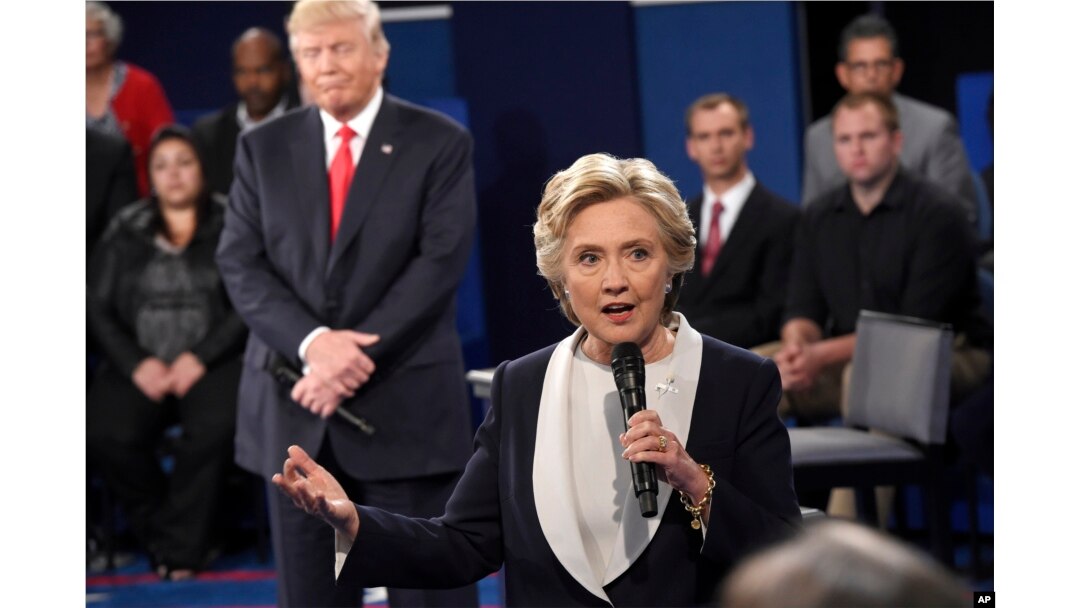In Stephanie Leichty's civics class one September morning, eighth-graders wrestled with the question of whether teachers should be armed.
Debating grown-up issues is part of the curriculum in her classes at Bluestone Middle School in rural Skipwith, Virginia, just north of the North Carolina border.
Leichty's brown bob and glasses frame a face that radiates competence, but with an undertone of warmth. "I think this is the most important class they have. We talk about the real world in here," she said.
It's about more, however, than current events. Leichty aims to instill in her students a rare skill in a politically polarized nation: how to disagree without being disagreeable.
This quality has been in remarkably short supply in the 2016 presidential campaign, as the debates between the candidates illustrate. Candidates Hillary Clinton and Donald Trump will face each other in the third and last debate Wednesday night.
It's one more reason Leichty and teachers like her want to bring back civil discourse.

Democratic presidential nominee Hillary Clinton speaks as Republican presidential nominee Donald Trump reacts during the second presidential debate at Washington University in St. Louis, Oct. 9, 2016.
Political classrooms
Their approach to teaching is based on research by two University of Wisconsin-Madison education experts, Diana Hess and Paula McAvoy. The goal of their 2015 book, "The Political Classroom," is to better equip educators to teach students how to deliberate the contentious issues they will face as adults.
McAvoy notes that the polarization of American society goes beyond politics. Over the past several decades, Americans have sorted themselves into increasingly like-minded communities.
That means "the less likely we are to even encounter people who disagree with us," she said. "And then when we do, often our instinct at the dinner party with your friends is to just avoid politics if we know we're going to disagree with each other."
That's bad for democracy, she adds. Fixing the problem, though, could start in civics class.
"With the help of the teacher, [students] can learn that disagreement is normal, that we can still be friends even if we disagree with each other politically."
FILE - local residents receive their ballots at the Polk County Election Office on the first day of early voting in Des Moines, Iowa.
Setting the tone
Many teachers worry that if they bring politics into the classroom, the class will devolve into a shouting match.
"But teachers can set a really clear tone," McAvoy said.
Leichty runs her class with a firm but kind hand.
Students start off with a news story from shortly after the 2012 massacre at Sandy Hook Elementary School that lays out arguments for and against arming teachers. They read additional material that adds more arguments, pro and con.
Leichty splits them into groups and assigns them a side to debate. "Be knowledgeable," she tells them to back up their arguments. "Have a 'why.'"
Each side gets a set time to make its arguments. Before the other side can respond, she has them recap what they heard.
This is one place where things could go badly. So Leichty sets the tone.
"Are you going to scream at them?"
"No," the students answer.
"Are you going to say mean and hurtful things, like, 'That was stupid?'"
"No."
"What's a really nice way to respond to somebody?"
"That is not exactly what I said," one student offers.
Respectfully disagree
Leichty's teaching students good ways to continue a conversation when it takes a negative turn, without letting it get out of hand.
"They need to remember that the person across from them is another human being with maybe some different thoughts and opinions," she said. "And just respecting that person is the most important thing they can do in that moment."
Also, she said, "I see a lot of kids that realize ... that they have to learn to listen to other people."
The students really seem to enjoy it. And McAvoy's research shows "when students discuss, and they're reading and comparing a lot of material and hearing from each other, they actually end up learning more" than they do in conventional class lectures.
McAvoy doesn't think better civics classes alone will save American politics.
"I'm not idealistic enough to think that if people can just discuss with each other, then the entire political system is going to change," she said. "The adults in the system need to work on their behavior."
McAvoy said she does think it should help students become better citizens. "They become habituated that [they] should pay attention, and that it's fun to talk about this with other people and hear what they have to say," she noted.
Leichty has bigger ambitions. She dreams of seeing her students run for office. "I want to be voting for my kids one day," she said.

